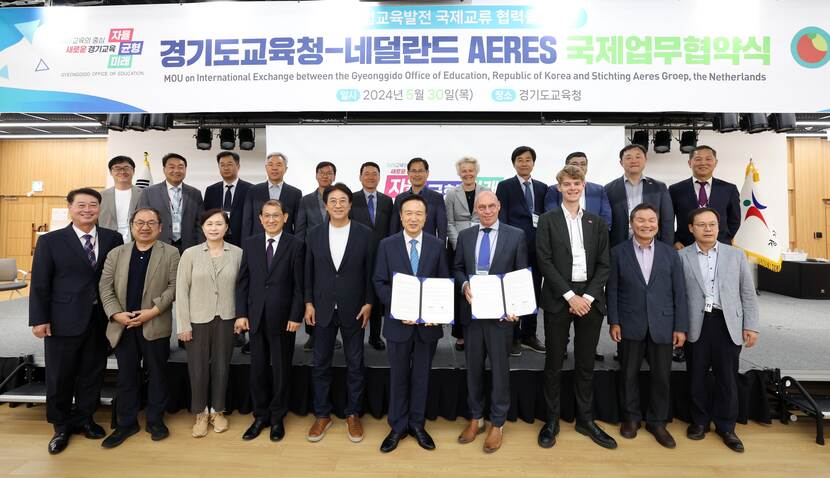Aeres Group will help South Korea to make an international high-tech agricultural school
From 29 till 31 May, a delegation from Aeres Group, led by Mr. Bastiaan Pellikaan, chairman of the Aeres Group, visited South Korea to sign an MOU with the Education Office in Gyeonggi Province, and explore agricultural schools, farms, and research institutes in the region. Through the MOU, the Gyeonggi Education Office will ask the Aeres Group to develop a curriculum for Yeoju Agricultural High School/College, reform the vocational education system, and send Korean teachers to Aeres to follow trainers' courses. As a result, both organizations will establish a partnership to train Yeoju students in Aeres, renovate facilities in the school, and develop diplomas along the standards of the Aeres Group. The final goal is to make an Aeres-style international school/college for Korea, East Asia, and Southeast Asia.

Current situation in Korean agricultural education
The Korean education system consists of a 6-year elementary school (7-12 years old), a 3-year middle school (13-15 years old), a 3-year high school (16-18 years old), and a 2- or 4-year university (from 19 years old). Of course, there are master's and doctoral degrees after graduation from a bachelor's degree.
South Korea also has some agriculture-specialized high schools to train students as farmers and 2-year junior colleges to raise agricultural professionals. However, those high schools and junior colleges lost their original function of training farmers because students prefer general high schools or universities to have good jobs in urban areas. Korean agriculture is relatively underdeveloped compared to other industries. Since the rural income is only 60% of the urban income, the younger generation avoids agriculture. The proposition to enter universities among high school students is around 80%. Not many Korean students choose vocational education to become agricultural farmers/professionals, like VMBO, MBO, or HBO in the Netherlands.
Recently, the Korean government has been trying to attract the younger generation to agriculture. As smart agriculture is becoming a trend in Korea, some university graduates, no matter what they studied in universities, are coming back to rural areas to be farmers, mainly for high-tech horticulture or livestock husbandry. However, they need vocational training to be proper farmers. It is a waste of time and energy in the respect that most of the education in universities is not that useful to them.
Why does the Gyeonggi Education Office want to work with the Netherlands?
Mr. Tae-Hee Lim, the superintendent of the Gyeonggi Education Office, recognized the problem and would like to revive the agricultural education system. Gyeonggi province's population is 14 million, and it is the leading province in business, industry, and economy as it is near the capital, Seoul. Mr. Lim thinks food security is becoming more critical than ever amid extreme climate changes and the decline in the agricultural population caused by extreme aging. The urgent need to foster agricultural talent is also being highlighted in South Korea.
The Netherlands is the second largest agrifood exporter in the world. It is not only ahead in terms of cultivation technology, but also boasts the world's most competitive industries related to facilities and equipment necessary for high-tech farming. In a nutshell, the Netherlands has everything from hardware and software to knowledge for smart agriculture. The core competitiveness of Dutch agriculture comes from the education system that fosters farmers who deal with these things.
Plan to develop an Aeres-style international high-tech agricultural school
Therefore, Mr. Lim wanted to work with the Netherlands to upgrade the agricultural education system. The Gyeonggi Education Office has kept in touch with the agricultural department of the Netherlands embassy in Seoul to seek opportunities for cooperation in agricultural education. Finally, the Gyeonggi Education Office has decided to join hands with Aeres to establish an educational institution to foster Dutch-style agricultural talent by reforming an agricultural school in the province, Yeoju Agricultural High School/College (3-year high school and 2-year junior college).
Although Yeoju Agricultural High School/College has only about 500 students, its campus area in Yeoju City is vast enough to reach 300 hectares. The school opened in 1945 and has various education facilities, practice facilities, and school forests. However, the facilities require an update, and the utilization rate of facilities needs to be improved.
The envisaged international school/college, promoted by the Gyeonggi Education Office, aims to implement Aeres' educational spirit while strongly taking into account domestic reality. The key is cooperation with companies and training focused on practice. At Aeres, nearly all students succeed in getting a (suitable) job when they graduate from the school. Gyeonggi Education Office intends to foster and supply the talent that the domestic agricultural industry needs. It will also start the internationalization of schools immediately by establishing itself as an Asian version of Aeres and attracting Southeast Asian, Chinese, and domestic students.